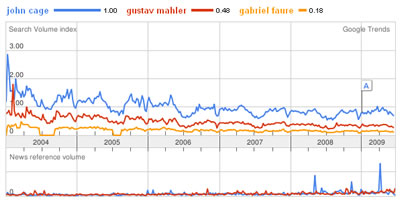Statistically Speaking, the End Is Near
|
Grant Chu Covell [July 2009.] I was fussing recently with Google Trends, an aspect of the Googleplex that “provides insights into broad search patterns.” I’m the sort who types “xenakis” or “lachenmann” into search engines just for the hell of it. If, like me, you’re into this kind of thing, you might like to know that Google Trends graphs search frequency over time, 2004 to the present. It’s possible to enter several terms to see which may be more common, or how they conform to a pattern. Composer searches follow a cycle. If I enter “john cage, gustav mahler, gabriel faure” (the results are better without Fauré’s accent), I get this:
Try it. The above graph is from 7/2/09. The data changes frequently. Google’s page posts instructions, information about the scale, and how the rankings work. Prominent news articles are flagged by boxed letters, in this case the blue A at 2009’s start for Cage. If we’re to believe Google Trends, Cage attracts more interest than Mahler. Improbable? It’s quite possible folks in quest of John Cage may actually be Ally McBeal fans, but bear with me for a bit. [John Cage is the name of a character in a then-popular, now-defunct TV sitcom. Ed.] Note how the frequency of searches has diminished since 2004. Google serves up fewer composer searches each year. Note also the recurring pattern of mid-year lulls and the downward spike at year’s end. I suspect that these lulls and dips correspond to the academic year, suggesting that most online composer searches occur at schools. Does the gradual decline mean that students have access to better reference material and don’t need to go online? Or does it mean that there are fewer of them doing online searches? Who knows, perhaps Google’s popularity is diminishing. A big-name “richard wagner, wolfgang mozart, ludwig van beethoven” search reveals a similar pattern, with an enormous spike corresponding to Mozart’s anniversary. Wagner appears to hold constant throughout the year. Try other bundles of unrelated composers (e.g., “charles ives, maurice ravel, anton bruckner”). Warning: This could get addictive. So, again, it seems that the academic year is the key factor. A “jane austen, robert frost, charles dickens” search maintains the same shape, although Jane Austen’s perennial popularity — now doused with zombies — disturbs the pattern. [A recently published book is entitled Pride and Prejudice and Zombies. Ed.] Does this mean that the world at large takes less interest in the classics, including kids in school? Looks that way.
[More Grant Chu Covell]
[Previous Article:
From the Diary of an Indolent Pianist]
[Next Article:
Visiting Scelsi]
|
